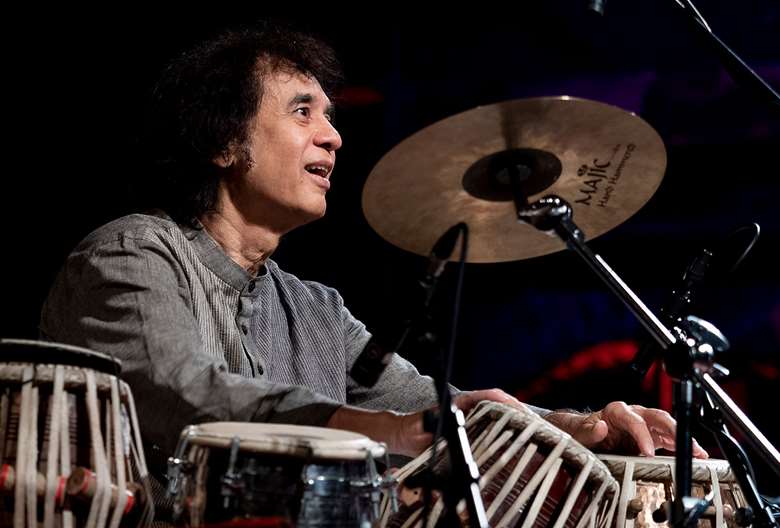Zakir Hussain: 09/03/51 - 16/12/24
Kevin Le Gendre
Monday, December 16, 2024
The great Indian percussionist has died aged 73, Kevin Le Gendre salutes his huge influence, prolific output across multiple genres and his importance as a true master musician who touched the lives of millions

In November, when Zakir Hussain was forced to pull out of a scheduled gig at the EFG London Jazz Festival with Dave Holland and Chris Potter, due to illness, there was a huge sense of disappointment but that has now turned to despair at the announcement of Hussain’s death at the age of 73.
He was a phenomenal tabla player who reached the highest standards of the Indian classical world and greatly contributed to many genres of western music, from rock and pop to jazz and film soundtracks. Perhaps more importantly, Hussain epitomised, through the immense stylistic range of his body of work, a spirit of adventure and openness that paved the way for players such as Trilok Gurtu.
The son of master tabla player Alla Rakha Qureshi, Zakir Hssain was born in Mumbai in 1951, learned music in the city and made his recording debut in 1970 with sarod player Vasant Rai. There was work with other renowned Indian musicians, such as Amjad Ali Khan, L.Shankar and Shivkumar Sharma, but Hussain made an impact on the international scene by raising the profile of Indian percussion, bringing his advanced rhythmic and metric skill to a number of European and American artists.
The likes of Van Morrison, George Harrison, Earth, Wind & Fire, Pharoah Sanders, Bill Laswell and Béla Fleck all hired him, while Mickey Hart of the Grateful Dead chose Hussain to be an integral part of his Planet Drum project, which drew on rhythm traditions from around the world. Husaain’s output between the 70s and 2020s was substantial and included work on scores for acclaimed movies such as Little Buddha, Apocalypse Now, and Heat And Dust. Hussain also appeared in the latter.
His collaborations with jazz artists reached back to 1976 when he recorded two landmark sessions, Karuna Supreme by John Handy and A Handful Of Beauty by Shakti with John McLaughlin. Both sets were groundbreaking unions of Asian and western improvisation and composition, and Hussain’s relationship with McLaughlin was resumed three decades later on the marvelous live album Remember Shakti, highlighting the intuitive chemistry between the pair and other players as well as their virtuosity. Hussain also performed remarkably on Jan Garbarek’s Making Music.
Small, dynamic, reflexive ensembles suited Hussain well, and the 2000s saw him excel with two trios. Sangam was a collaboration with saxophonist Charles Lloyd and drummer Eric Harland while Crosscurrents brought him together with saxophonist Chris Potter and double bassist Dave Holland, both to the delight of international audiences. On stage Hussain was a total marvel, seamlessly shifting from one complex cycle of beats to another, exuding great charisma and indulging in occasional humour. Despite the solemnity of his music he was not averse to raising laughs by quoting The Pink Panther theme on the low tabla in the middle of an extended solo.
Hussain’s strong, engaging personality as well as immeasurable talent will ensure his place in any pantheon of serious music, be it in India, Europe or the Americas.


